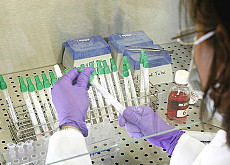
Controversial gene tests already used by Swiss

The French parliament has voted a hotly contested DNA amendment to a new immigration law, opening the way to genetic testing for family reunification cases.
The opposition to this legislation has been such that some Swiss politicians and activists are suddenly worried about a procedure that was already implemented in Switzerland in 2004.
The new French legislation tightens the conditions under which immigrants’ families may join them in France, and the amendment that originally would have imposed compulsory DNA testing aroused heated debate.
It was watered down to make the tests voluntary and based on the mother to avoid paternity disputes. They will be paid for by the state rather than by immigrants themselves, but it remains highly controversial.
Fearing an erosion of individual freedoms, many parliamentarians, including some belonging President Nicolas Sarkozy’s dominant UMP party, abstained or voted against the measure.
Comparisons were drawn between the DNA tests, to be introduced for an 18-month trial period, and anti-Jewish discrimination under the Vichy government that collaborated with Nazi Germany during the Second World War.
In Switzerland these tests have been used for a number of years. The Federal Migration Office has set out guidelines to the cantons on family reunifications, including on the use of DNA testing.
Clarification
Genetic testing is supposed to be used if an official has doubts about the authenticity or the validity of the documents submitted for the procedure. It can be applied to the citizens of 33 countries, most of them African.
These nations were singled out because their registry offices are not considered trustworthy.
Carlo Sommaruga, a parliamentarian from the centre-left Social Democratic Party, says he was shocked when he recently found out about the procedure and has demanded some clarification from the government about what he sees as a lack of necessary legislation.
“I didn’t think this sort of thing could happen in Switzerland without some real parliamentary debate,” he told swissinfo. “It’s like breaking into someone’s home through the back door.”
But migration office spokesman Jonas Montani claims that a legal base exists, since the tests are supposed to be covered by a new foreigners’ law that goes into effect on January 1 as well as legislation on genetic testing introduced in April.
The office’s guidelines were sent out in September 2004 but there are no available figures on how often the tests are used.
Even though there is a legal base now, concerns remain. “Parliament didn’t realise what it was getting into with this [new] legislation and there was no debate about this intervention in the private sphere,” said Yann Golay of the Swiss Refugee Council.
Ethical issue
While the migration office insists on the voluntary aspect of the testing, the Federal Data Protection and Information Commissioner’s office says this is of little comfort.
“If a person refuses to submit, they are likely to face a refusal for their request,” said spokesman Daniel Menna. “However, parliament voted the legislation and we cannot do anything about it.”
Alexandre Mauron, a member of the national ethics committee, reckons the legal situation is not so clear, since the decision to propose a test is in the hands of an official and not a judge.
“People should also not be asked to provide proof of a biological link since it doesn’t always exist and Swiss law insists first and foremost on social ties,” he added.
Up to one father out of every ten is not the biological father according to some estimates.
swissinfo
People allowed to enter Switzerland under the family reunification procedure:
33,503 in 2004
31,636 in 2005
30,701 in 2006
Eleven European Union countries already use DNA testing for family reunification procedures.
Germany, Austria, Belgium, Denmark, Finland, Italy, Lithuania, Norway, the Netherlands, Britain and Sweden have all introduced the procedure.
According to the Geneva-based International Organization for Migration, countries are increasingly using DNA testing to make determinations in family reunification cases when identity documentation is considered unsatisfactory.
It warns there are a number of ethical issues related to these tests:
– Families are not biological constructs.
– There is no universally recognized definition of “family”.
– Test results may be extremely disruptive to the family unit.
– Not everyone will be able to provide DNA test results on request.
– Requests for testing may be discriminatory.
– Immigration officials could reject previously acceptable documentation.
DNA profiling is an increasingly important tool in solving crimes, as well as for checking family relationships in immigration and paternity disputes.
Discovered in the 1980s, the technology makes use of the fact that small sections of DNA repeat themselves over and over in a way that is unique to each individual.
The chance of two strangers of having identical DNA is less than one in 1 billion. The chance of a match with a relative, though, is much higher.

In compliance with the JTI standards
More: SWI swissinfo.ch certified by the Journalism Trust Initiative































You can find an overview of ongoing debates with our journalists here . Please join us!
If you want to start a conversation about a topic raised in this article or want to report factual errors, email us at english@swissinfo.ch.